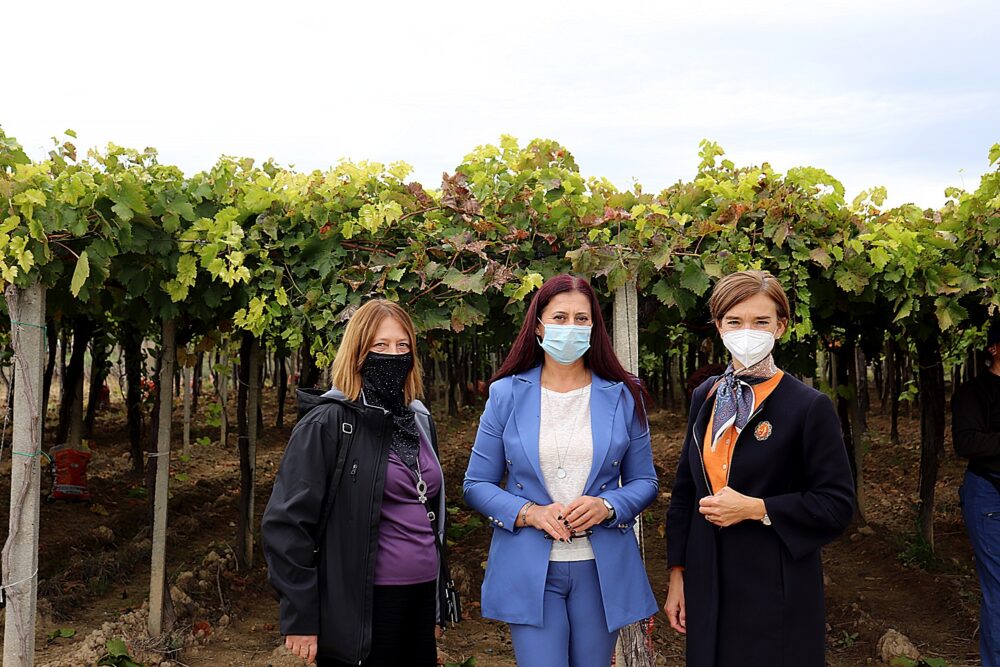Amplifying rural women’s voices in North Macedonia
Date
October 15, 2020
Regional Director of We Effect Europe, Anneli Leina (left), the President of partner organisation NFF, Vaska Mojsovska (center) and Swedish Ambassador to North Macedonia, Kristin Forsgren Bengtsson (right); Photo: Ljiljana Mitevska
“Women are often the invisible work force in agriculture suffering a lot of discrimination. As you can see, I decided to come and see the hard work carried out by rural women myself today, here at the farm of Vaska Mojsovska,” said Kristin Forsgren Bengtsson, Swedish Ambassador to North Macedonia, speaking directly from the field, in the village of Timjanik, at the online event organised by We Effect’s partner organisations in the country, NFF and RDN, on the occasion of 15th of October – the International Day of Rural Women.
Ambassador Bengtsson emphasized that this year, difficult as it has been, has put a rare spotlight on women. “Women farmers have one of the worst working conditions, with no pay, little or no social and health protection and limited or no access to financial services. They also remain largely excluded from owning land and their participation in decision making processes is not sufficient either. In time of crisis, when inequality risks are worsened, the implications on rural women’s lives and livelihood can be serious. And that is not the future we want. We want to see progress and that is why Sweden, with the help of We Effect, supports North Macedonia in improving the conditions for the rural women and increasing the visibility of women’s work in agriculture,” said Ambassador Bengtsson.
The women living in the rural areas are the backbone of the rural communities, yet they still have fewer opportunities than men. As traditional food providers and carers for the households, they have the essential role of ensuring the household food security. But they are also the base of the rural economy working as farmers, wage earners and entrepreneurs.
“We Effect’s supported projects in North Macedonia demonstrate that investing in rural women can generate significant improvements in productivity, food security and sustainable farming. Entire communities benefit socially and economically when women have access to land, education, training, financial services and strong organizations. Therefore, closing the gender gap in agriculture is not just a women’s issue, it is a family issue and community issue,” emphasized Anneli Leina, the Regional Director of We Effect Europe.
The empowerment of women and equal opportunities for both sexes are fundamental in reducing poverty. This is especially important if we know that North Macedonia’s rural areas are home to 40 percent of the population and two thirds of its poor people.
“That’s why today it’s crucial to recall that poverty reduction, sustainable development, and food security are not possible without empowering rural women,” said Regional Director Anneli Leina.
The President of the Rural Development Network (RDN), Petar Gjorgievski, emphasized that “we need to inspire rural women by presenting good practices and success stories of women entrepreneurs in rural areas, which would be a motivation to other women and a proof that they are powerful in breaking free from traditional constraints, able to change habits and to break stereotypes.”
Giving a voice to rural women and reinforcement of their leadership at all levels – from farms to national farmers’ organisations is a prerequisite for better and secure future. This is especially important now, during the corona pandemic when it’s becoming evident that the women are the pillars that are supporting us throughout this crisis.
They are bearing the burden of sheltering family members from harm, caring for the children and the elderly and, at the same time, working. The facts from the ground are certainly supporting this claim.
“The analysis of our organisation about the impact of the corona crisis on the agriculture, supported by We Effect, showed that 85% of the women living in the rural areas had increased workload both in the field and at home. A total of 64% of rural women are not active in the labour market due to employment in household and childcare, and 47% of unemployed rural women do unpaid work on family farms,” said Vaska Mojsovska, President of the National Federation of Farmers (NFF).
Together with our partner organisations we advocate for more investments in rural women, underlining the importance of prioritizing women’s needs within national agricultural programmes. “Pushing for changes and creation of measures and policies with special emphasis on improving the economic and social position of the women in the rural areas are our priorities,” said Vaska Mojsovska.
The Minister of Labour and Social Policy of North Macedonia, Jagoda Shahpaska, Deputy Minister of Agriculture, Trajan Dimkovski, members of the establishment and all present guests at the online event, such as academia and representatives of international development organisations, were able to hear directly from the rural women about their challenges and the obstacles that they are encountering in their everyday life, especially now during the corona crisis.
Some of the clearly detected problems for the rural women during the current situation are reduced access to quality health services, increased level of unpaid work, intensification of the gender-based violence, misinformation and lack of access to critical technologies in order to improve their work and personal life.
Apart from the discussion on the topic Rural Women and the Corona Crisis, two videos about rural women’s lives and their struggle for economic empowerment were broadcast live during the event.
Celebrations of the International Day of Rural Women were also held in the rest of the countries of Europe region.